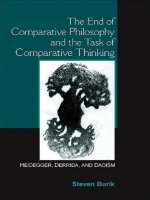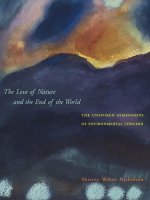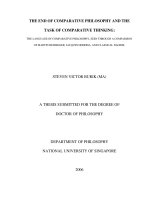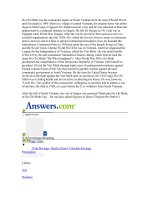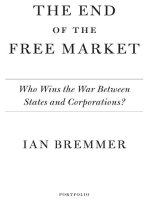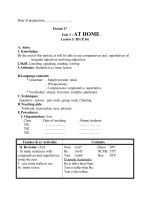Imperial twilight the opium war and the end of chinas last golden age
Bạn đang xem bản rút gọn của tài liệu. Xem và tải ngay bản đầy đủ của tài liệu tại đây (5.45 MB, 148 trang )
Tai Lieu Chat Luong
ALSOBYSTEPHENR.PLATT
AutumnintheHeavenlyKingdom:
China,theWest,andtheEpicStoryoftheTaipingCivilWar
ProvincialPatriots:
TheHunaneseandModernChina
ForFrancie,Lucy,andEliot
Desolatecastle,thesky,thewidedesert.
Thereisnowalllefttothisvillage.
Boneswhitewithathousandfrosts,Highheaps,covered
withtreesandgrass;Whobroughtthistopass?
Whohasbroughttheflamingimperialanger?
Whohasbroughtthearmywithdrumsandwithkettledrums?
Barbarouskings.
Agraciousspring,turnedtoblood-ravenousautumn…
—LIBO(701–762),TRANS.EZRAPOUND,
“LamentoftheFrontierGuard”
Weaveacircleroundhimthrice,Andclose
youreyeswithholydread,Forheon
honey-dewhathfed
AnddrunkthemilkofParadise.
—SAMUEL TAYLOR
“KublaKhan”
COLERIDGE,
Contents
Cover
AlsobyStephenR.Platt
TitlePage
Copyright
Dedication
Epigraph
Maps
Introduction:Canton
PROLOGUE
TheJourneyofJamesFlint
PARTI
GraciousSpring
CHAPTER1
ATimeofWonder
CHAPTER2
BlackWind
CHAPTER3
TheEdgeoftheWorld
CHAPTER4
SeaandLand
CHAPTER5
PointsofEntry
CHAPTER6
HiddenShoals
PARTII
TheMilkofParadise
CHAPTER7
BoomTimes
CHAPTER8
FireandSmoke
CHAPTER9
Freedom
CHAPTER10
ADarkeningTurn
CHAPTER11
MeansofSolution
CHAPTER12
TheLastHonestMan
PARTIII
Blood-RavenousAutumn
CHAPTER13
Showdown
CHAPTER14
WillandDestiny
CHAPTER15
Aftermath
CODA
HouquaandForbes
Acknowledgments
Notes
Bibliography
IllustrationCredits
ANoteAbouttheAuthor
Introduction:Canton
Ifyoustandoutsidethewall,itisimpossibletogaugethesizeofthe
city.Cantonisbuiltonaplain,sothelow,flatbuildingsofbrickand
wood that lie inside are invisible from where you stand. The wall is
thirtyfeethighandcrenellated,builtfromlargeblocksofsandstoneat
itsbaseandsmallerbricksabove.Itstretchesasfarasyoucanseein
eitherdirection,withfortsvisibleontopatregularintervals,cannons
peeringoutward.Nearyouisoneofthetwelvemassivewoodengates
that open into the city, a shadowed cave guarded by soldiers and
horsemen. The gates creak open each morning at dawn, and close
againeacheveningaround9p.m.Notthatyouwillbeallowedin.As
aforeigner,youarestoppedatthegateandturnedaway.Youwillnot
see the fantastic warren of narrow streets inside, paved with thick
slabs of granite. You will not see the dense brick houses with their
sloping tiled roofs, the vast examination hall with its thousands of
cells,thelavishmansions,thetemples,thegardens,orthegovernment
officesthatliewithin.1
Instead,youstayoutsideandwanderbackthroughthesuburbs,the
sprawlingandamorphoussettlementssurroundingthewallwhereyou
couldwalkformileswithoutanysenseoftheircomingtoanend.Itis
steamyweather,sohumidyoursweatseemstojustblendintotheair
around you. The paved streets are twisting and so very narrow that
you can sometimes touch the walls on both sides at the same time.
Thebuildingshere,frontedwithfragrantcarvedwood,aremostlytwo
stories high, with tall shutters on the windows. Above you, laundry
hangstodryonlinesstretchedacrossthetopofthealley,creatinga
canopy effect. It is hard to hear over the din of the hawkers and the
shouting of porters and chair-bearers as they try to push their way
through. Everywhere is the press of humanity—people traveling on
foot or carried in sedan chairs, lounging in the alleyways, eating in
open-air restaurants as street performers and beggars ply them for
money.
If there are other foreigners about in the suburbs you might
overhearafewsnatchesofPidginEnglish,thelocaltradinglanguage.
It is a hybrid of the Cantonese dialect of the city and the European
tongues native to the foreigners who come to trade here (“pidgin”
means“business”).ForthemostpartitismadeupofEnglishwords,
sometimeswithabitofHindiorPortuguese,settoChinesegrammar
and pronunciation. It is a meeting ground between vastly different
languagesandwilltakesomegettingusedto.Fragmentsofitwillbe
absorbed back into English—having a “look-see” or eating “chow,”
askingsomeonetohurryup“chop-chop”ortellingthem“Longtime
nosee.”Initsfull-blownformitisacolorfulsingsongofalanguage.
“Isawamaneating”becomes“Mylook-seeonepieceemancatchee
chow-chow.” “He has no money” translates to “He no hab catchee
dollar.”“Youbelongysmartinside”means“You’reverysmart.”
ACantonstreetscene
VerticalsignshangfromthesidesofmostbuildingswithChinese
characters announcing what is for sale in the shops on the ground
floor.Youcan’treadthem.Butyoumayberelievedtoseethatsome
stores have signs written out in English letters to lure you in. You
enteroneoftheseshopsthroughatallcentraldoorwayflankedbytwo
large open windows. It is cooler inside, out of the sun. There is a
counternearoneofthewindows,piledwithwritingmaterials.Aclerk
flips the beads of an abacus rapidly with one hand while he writes
downcalculationswiththeother.Itisquietexceptfortheclickingof
the abacus. The shop is crammed to the rafters with silk of every
description.
Backoutinthealleyyoucontinueonyourway,pastshopsselling
tea, medicine, porcelain, a hundred other goods. A great deal of
money changes hands here. There are craftsmen and artists—cabinet
makers, blacksmiths, tailors, painters. The painters work in oil, on
glass or canvas. They can produce Chinese or European images for
you with equal skill, easily replicating anything you bring to them.
They will even hold sittings for a visitor like yourself to get your
portrait painted. Some of the foreigners say their oil portraits aren’t
always so flattering. But as the joke goes, when they complain the
painters just tell them, “No hab got handsome face, how can hab
handsomepicture?”
Itisnotacleancity—thoughneither,forthatmatter,areLondonor
Boston.ItisespeciallyfilthynearthePearlRiver,whichiswherewe
areheaded.Thesluggishwaterofthecanalsfeedingintotheriveris
thick with sewage and refuse from the nearby houses. Rows of
sampansaretied upseveral deepinthe river,where theboat people
live.Pilesofgarbagearestrewnalongthebank.Thesmellofrefuse
stewing in the humid warmth is something you will stop noticing in
time.
Nowwecometothefactorydistrictattheedgeoftheriver.Thisis
whereyoubelong.
Whatyouwillnoticefirstasyouenterfromalongtheriveristhe
relativelyenormousamountofopenspacebeforeyou.Youhaveseen
nothinglikeitinthetightlypackedsuburbs,wherealleygiveswayto
alley and there are no open public areas (the great gardens of the
suburbsareprivateandliebehindwalls).Buthereisawideexpanse
of hard-trodden dirt with space to walk around freely. This plaza of
reclaimedland—thesquare,asitisknown—slopesgentlydowntoa
muddy riverfront densely crowded with ships. The ships here are all
smallones,fortheriverisfairlyshallow;allofthegiantoceangoing
vesselsyoumighthaveexpectedtoseeareabouttenmilesdownriver
atadeeperanchoragecalledWhampoa.
There are small groups of Chinese wandering around on the open
square, and if you turn away from the water you will see what they
have come for. Jarringly out of place in comparison to the low
wooden houses of the suburbs, here is an imposing row of thirteen
largebuildingsofbrickandgranite,higherthananythingyouhaveyet
seen in Canton—higher even than the city wall. They are distinctly
European in appearance, with columned verandas and terraces.
Several have tall flagpoles out front that fly the national flag of a
Westerncountry:Britain,France,theUnitedStates.
These are the factories, where the foreigners live. In spite of the
name, they are not sites of manufacturing (a “factor” is a term from
Indiameaningatrader).Theycontainlivingquarters,warehouses,and
offices.EachonehasaChinese“compradore,”orchiefsteward,who
staffs it with a small army of servants—cooks, valets, butlers, even
menialservantstopulltheropesthatkeeptheceilingfansspinningin
thisoppressiveheat.Theykeepthefactorieswellsuppliedwithfood
and other necessities. Some have a few head of livestock or a milk
cow on hand. If a factory is inhabited by a single national group, it
getstoflyitsflagoutfront.Theoneswithoutflagshostavarietyof
foreignbusinessmen,manyfromIndia.
Forthemostpartthefactorybuildingshavebeenbuilttouchingone
othertoeconomizeonspace,buttherearethreegapsbetweenthem—
short,busystreetsfilledwithsingle-storyChineseshops.Evenonthis
small scale there are important gradations, better or worse parts of
“town.” The more respectable alleys are New China Street and Old
ChinaStreet—towardtheleftifyoufacethefactoriesfromthewater.
About twelve feet wide, they have orderly rows of retail stalls and
tailor shops, a place for temporary visitors to pick up souvenirs and
get clothing made. The less respectable alley, a narrower and dirtier
oneofftotheright,iscalledHogLane,anditismainlycrammedwith
barscateringtoforeignsailorsfromtheshipsdownatWhampoa,who
occasionally get a few days of shore leave, which—as in any other
port they might encounter—they mainly spend getting drunk. The
Chinese proprietors of the bars have adopted English names like
“JollyJack”and“TomBowline.”Theirliquorshacksaresotinythey
don’thavebenchesorabarperse,justaropeoverwhichasailorcan
hangbyhisarmpitsanddrinkuntilhepassesout.
TheforeignfactoriesatCantonandthesquareinfrontofthem
In all the compound, it is the British factory that is most striking.
Larger than the others, it has its own fenced-in space in front that
reachesallthewaydowntotheriverbank.Standingoutinfrontunder
thelimpUnionJackonthissultryafternoonyoucanseethefactory’s
broad,columnedterracewithaviewupanddowntheriver,wherethe
merchants of the East India Company can enjoy their tiffin and
sometimes catch a bit of a breeze. If you go through the front gate,
pastthevigilantChineseguardwithhisrattancane,enteringthrough
theshadeoftheveranda,youwillfindupstairsaEuropeanworldthat
mightmakeyouforgetwhereyouare.Alongthewidehallwaysyou
will find counting rooms, tea-tasting rooms, and parlors. There is a
chapelwithaspirethatholdstheonlypublicclockinthecompound.
There are well-appointed living apartments, a dining hall with room
for more than a hundred guests, a billiard room, a library of four
thousandbooks.
Lookingaroundinsidethevast,chandelieredBritishdininghall—
theportraitofakingononewall,aformerambassadoronanother—
drinkingyoursherryasabustlingcrowdofservantspreparestoserve
adinnerofroastbeefandpotatoeswithgravy,youcouldbeforgiven
forimaginingyouhadstumbledintosomecolonialoutpost.Butthisis
notIndia.TheBritisharenotinchargehere.TheChineseare.These
buildings are, all of them, owned by Chinese merchants, who rent
themouttotheforeigntraderssotheywillhaveaplacetostayanddo
their business. The armies of servants answer to their Chinese
superiors,nottothosetheywaiton.Theyreportwhatgoesonwiththe
guests. Watched over at all times, the foreigners feel sometimes like
grubby infants—coddled and helpless, attended always by their
nurses.Theyneedpermissiontodojustaboutanything.
Asopulentasthesesurroundingsmaybe,theresidentssometimes
feelthattheyhavevolunteeredtobecomeprisonershere.Despitethe
feeling of open space outside on the square, the compound is quite
limited in size. It runs for just three hundred yards along the
waterfront,andbetweenthesquareoutfrontandtheextensivefactory
buildingsbehind,itisabouttwohundredyardsdeep.Thelongeryou
are here, the smaller it will feel. Foreigners are not permitted to go
intothecityitself,andtheycanonlywanderthroughtheverynearest
parts of the suburbs. Farther on, and throngs of young boys will
materializetothrowrocksatthemandcallthemforeigndevils.Even
farther, and Chinese soldiers will come to escort them gently home.
Every ten days a small group is allowed to take the air in a nearby
garden.Otherthanthat,thisistheirgildedcage.Thereisnothingelse
like it in the world. The entire formal trade of Europe and America
withChina,thelargestempireinexistence,goesonhereinaspaceof
just twelve acres—less, some like to point out, than the footprint of
oneofthepyramidsinEgypt.
Youmaynotwanttospendtoomanyyearsofyourlifehere,butas
youseeitintheearly1830s,Cantonhardlyseemsthekindofplaceto
startawar.
NoeventcastsalongershadowoverChina’smodernhistorythanthe
OpiumWar.Sparkedbyanexplosiveseriesofeventsthattookplace
intheCantonfactorycompoundin1839,thewarwouldendin1842
with China’s humiliating defeat and a treaty all but dictated by the
Britishaggressors,settingadisastrouspatternforthecenturytocome.
Textbooks in China on “modern” history, as a rule, take the Opium
Warastheirstartingpoint,themomentwhenChinaleftitstraditional
past behind and was dragged forcibly into the world of European
imperialism. The war occupies that place not because it was so
destructive; in fact, it was relatively small and contained. It caused
none of the large-scale social dislocation that China’s major internal
wars of the nineteenth century like the Taiping Rebellion did. It did
nottoppletherulingdynastyorevenremotelythreatentodoso.There
weren’teventhatmanybattlesfought.
ButthesymbolicpoweroftheOpiumWarisalmostlimitless.Ithas
longstoodasthepointwhenChina’sweaknesswaslaidbarebefore
the world, the opening of a “Century of Humiliation” in which
Western(andlaterJapanese)predatorswouldmakewaronChinato
bully it into granting territorial concessions and trading rights. It
markedaseachangeinrelationswiththeWest—theendofoneera,
when foreigners came to China as supplicants, and the dawn of
another, when they would come as conquerors. And it carries
especiallystrongpowerbecauseChinaunquestionablyhadthemoral
high ground: as remembered since, and as charged by critics at the
time,GreatBritainunleasheditsnavyonanearlydefenselessChina
inordertoadvancetheinterestsofitsnationaldrugdealers,whofor
yearshadbeensmugglingopiumtoChina’scoastagainstthelawsof
thecountry.Theshockinggroundsofthewarhaveprovidedthevery
foundation of modern Chinese nationalism—from the overthrow of
theQingdynastyin1912andtherise,firstoftheRepublic,andthen
the People’s Republic of China, the Opium War has stood for the
essence of everything modern China has tried to leave behind:
weakness,victimhood,shame.
Becauseweliveinaworldsoheavilyshadowedbythismemory,it
has been easy for westerners of more recent generations to imagine
that this was always the case—that weakness and victimhood were
somehow inherent to China’s nature. Through the twentieth century,
Chinawasapoor,vulnerable,andfrequentlychaoticnationthatnever
seemedacontenderforpower.Athird-worldnationintheeyesofthe
wealthier countries, it was alternately a pariah or an object of
sympathy. For that reason, the country’s worldly aspirations of the
latetwentiethandearlytwenty-firstcenturies—toplayaleadingrole
in the UN, to host the Olympics, to put a man on the moon—were
initiallyviewedbyoutsidersalmostwithbemusement,asifitwerean
overlyambitiousupstartforgettingitsproperplace.Thatbemusement
hasnowgivenwaytoalarminmanyquartersasChinastrengthensits
navalpowertounprecedentedlevelsandlaysclaimtovastswathsof
contested maritime territory, asserting its power in ways completely
unknowntolivingmemory.
Butoverthelongterm,Chinaisanythingbutanupstart.Andasits
economic and military power today grow far beyond anything it
seemedcapableofinthetwentiethcentury,itiscomingtoresemble
farlesstheweak,bulliednationthatsufferedtheOpiumWarthanthe
confidentandcentralempirethatprecededit.Ifwetakethiswarnot
asabeginningbutasanending,andshiftoursightsinsteadbackinto
theerabeforeittookplace,backbeforethatostensibledividingline
withthemodernera,wefindaChinathatwaspowerful,prosperous,
dominant, and above all envied. The memory of that lost era looms
everlargerinChinatoday,asareminderofitspotential(somewould
sayrightful)placeintheworld,anostalgicvisionofwhatitcouldbe
onceagain.
ThisisabookabouthowtheOpiumWarcametobe—thatis,how
Chinadeclinedfromitseighteenth-centurygrandeurandhowBritain
becamesufficientlyemboldenedtotakeadvantageofthatdecline.The
centralquestionofthewar,asIseeit,isnothowBritainwon,forthat
wasneverinseriousdoubt—inmilitarytermstheOpiumWarpitted
themostadvancednavalpowerintheworldagainstanempirewitha
longandvulnerablecoastlinethathadnotneededaseagoingnavyin
morethanahundredyearsandsodidnothaveone.Rather,thecentral
questionisamoralone:howBritaincouldhavecometofightsucha
war in China in the first place—against, it should be noted, savage
criticismbothathomeandabroad.
Asenseofinevitabilityhasalwaysbeenprojectedbackwardsonto
thiserainhindsight,asifthewarwerealwaysmeanttobe,butwhen
viewedinthelightofitsowntimetheOpiumWarcouldhardlyhave
been more counterintuitive. Aside from the audacity of sending a
small fleet and a few thousand troops to make war on the world’s
largestempire,criticsatthetimepointedoutthatBritainwasputting
its entire future tea trade at risk for only the vaguest and least
justifiable of goals. It seemed paradoxical in the 1830s that a liberal
Britishgovernmentthathadjustabolishedslaverycouldturnaround
and fight a war to support drug dealers, or that proponents of free
trade would align their interests with smugglers. If we revisit these
events as they actually unfolded, rather than as they have been
reinterpreted afterward, we find far more opposition to this war in
Britain and America on moral grounds, and far more respect for the
sovereigntyofChina,thanonewouldotherwiseexpect.
Onereasonareadermightnotexpectsuchoppositiontothiswaris
that we too easily forget how much admiration China used to
command. Because of its great strength and prosperity in the late
eighteenth century, Europeans viewed China in a dramatically
differentlightthantheydidtheothercountriesoftheEast.Atatime
whenIndiawasanobjectofBritishconquest,Chinawasanobjectof
respect, even awe. Occasional calls for the use of naval power to
advancetradetherewerestruckdownasself-defeating,whileBritish
tradersinCantonwhomadetroubleweregenerallyorderedhomeor
atleastremindedtobehavethemselves.Incommerce,Chinaheldall
thecards.InstarkcontrasttotheBritishOrientalistvisionofIndiain
the late eighteenth century—lost in the past, childlike and divided, a
prize to be captured and controlled—China represented instead a
strong,unifiedempireandanotherlivingcivilization.
For that reason, readers who are familiar with the East India
Company as a force of imperial conquest in India will find a very
differentfaceofitinChina.WhenyoungBritonswenttoworkforthe
Companyoverseas,itwasIndiathatattractedthemilitaryadventurers,
the administrators, those with dreams of empire. The bean counters,
bycontrast,wenttoCanton.(Andremarkably,itshouldbenotedthat
in the early nineteenth century those bean counters in their quiet
factoriesservedtheCompany’sbottomlineinLondonfarbetterthan
the conquerors of India did.) Even as goods—especially cotton and
later opium—flowed steadily from India to China, there was almost
noprofessionalcirculationbetweenthetworegions,whereCompany
agents developed largely separate worldviews. When visitors
acculturated to British India intruded into the separate world of
Canton,theywouldoftencauseproblems—notjustwiththeChinese,
butwiththeirmoreexperiencedcountrymenaswell.
TheOpiumWarwouldforcethosetwoworldstogether,taintingthe
oldadmirationandrespectforChinawithatasteforblood.Thewar
would never be universally popular in Britain, however, and fierce
opposition to the use of force in China would linger for a long time
afterward(anothercontroversialChinawarinthe1850swouldentail
the dissolution of Parliament and new elections to disempower the
Britishlawmakerswhotriedtostopit).Nevertheless,bythetimethe
warfinallybegan,anongoingcollisionoftwocompetingworldviews
—betweenthoseBritishwhorespectedChina’spowerandprosperity
and those who said it was no more enviable than India—reached a
crucialthreshold.
Thus, while the Opium War was ultimately a war over trade, the
story of its origins is, to a significant degree, the story of how the
grandmysteryofChinafadedinthecoldlightofknowledgeasBritish
subjects first began to learn the language and explore the interior of
the country—and, pursuant to those projects, how the admiring
WesternviewsofChinathatweresoprevalentinthelateeighteenth
centurycametobeerodedovertimebydisillusionmentandcontempt.
Within that shift lies the key to understanding how Britain’s
government could come to a point in 1839 where it was willing to
consider,forthefirsttimeintwohundredyears,theuseofviolenceto
furtheritseconomicendsthere.
WesternhistoriesoftheOpiumWarforgeneralreadershavelong
told the story with a wink as the predictable triumph of West over
East,alessontaughttoachildishpeoplewhodaredtolookdownon
theBritishasbarbariansandtriedtomakethem“kowtow”(aloaded
termthatusedtoindicateaspecificceremonyofkneelingbeforethe
Qing emperor but now lives on in our language with the general
meaningof“showingobseqiousdeference”).Insuchaccounts,China
typically appears as an unchanging backdrop, a caricature of
unthinkingtraditionsandarrogantmandarinsstuckintheancientpast
whoareincapableofappreciatingtheriseofBritishpower.2
With this book, I aim instead to give motion and life to the
changing China that lay beyond the confines of Canton in the early
nineteenth century—the rebellions, the spread of corruption, and the
economic troubles that preoccupied the country’s rulers and formed
thewidercontextfortheissuesofforeigncontactthatlieatthestory’s
center. Though the Chinese of this era have long been depicted as
oblivioustotheoutsideworld,thatisafalseview.Coastalofficialsin
ChinawerefullyawarethattheyhadnocapacitytoresistaEuropean
navy; they knew what the British were capable of if given cause for
war. Their naiveté, such as it was, resulted not from ignorance but
fromtheirfaithinthestabilizingpoweroftrade—inparticular,their
assumptionthataslongastheBritishenjoyedprofitablecommercein
Canton they would never have reason to resort to violence (a belief
thatwassharedalongtheway,incidentally,bynearlyeveryoneinthe
Britishgovernmentwhohadasayinthematter).
OntheWesternsideofmystoryisacastofBritishandAmerican
sojournerswhotriedtogetbeyondtheirlimitedconfinesinCanton—
traders, explorers, missionaries, government agents, and smugglers
who,foravarietyofreasonsbothcommendableandnot,triedtosee,
contact,andunderstandmoreofthecountrythantheyweresupposed
to. Together, they embodied the long Western dream of opening
China—“opening” here not to mean that China was always and
universallyclosed(itwasnot),buttocapturehowitwasexperienced
by the British and Americans of the late eighteenth and early
nineteenth centuries. They were tightly restricted in their ability to
conducttrade,theywereforbiddentolearntheChineselanguage,and
they were kept within exceptionally close boundaries with no ability
to travel farther into the empire or interact with the general
population. Some wished it were otherwise, and their efforts in that
directionwouldhavegreatrepercussions.
On the Chinese side, meanwhile, this is the story of an empire in
decline from a lofty, almost unimaginable height—a wealthy,
powerful, civilized state controlling roughly a third of the world’s
population, riven by internal pressures of overpopulation, official
corruption, and sectarian dissent (all three of which, notably, count
again among the Chinese government’s most pressing concerns
today).Thecharactersonthissidewillincludeemperorsandofficials
who tried to maintain the order of the state, rebels and others at the
fringes of society who tried to subvert it, and reform-minded
Confucian scholars who—far from clinging blindly to tradition—
proposed creative and pragmatic solutions to the problems of their
time.Together,theChineseandWesternsidesofthestoryaremeant
togivethereaderabroadervisionofthisgrandeclipseofempiresin
the early nineteenth century—China, crossing its meridian and
entering into a long decline, while Britain rose to new nationalistic
heightsthroughitsvictoriesintheNapoleonicWarsandbeyond.The
OpiumWarwasthepointwherethosetwoarcsfinallycrossed.
In closing, a word on inevitability. Although this early age of
contact between China and the West has long been treated in
retrospectasifitweresomehowalwaysdestinedtoendinwar,itwas
not. The Opium War did not result from an intractable clash of
civilizations, as it would later be framed in the West. Neither did it
representtheculminationofsomegrandimperialmasterplan,asitis
generally understood in China. To nearly all parties concerned,
includingeventhegovernmentministerswholaunchedit,thewarwas
all but unthinkable until it actually began. The truth is that over the
long term, the foreigners and Chinese who came together at Canton
found far more common ground than conflict. This book will have
much to say about the individuals who made the war possible, but
theyarebynomeansthewholestory.Itisalsoabookaboutthemany
others, now mostly forgotten, who stood against the more familiar
currentsoftheirtimeandcanremindushowdifferentlythecourseof
eventsmighthavegone—amongthemBritishactivistswhoopposed
the opium trade, Chinese scholars who counseled pragmatism in
foreign relations, and Americans whose relationships with their
Chinese counterparts set a more positive pattern than most of the
British.Aswelooktothefutureofourownera,withChina’sarconce
again ascendant, such figures are every bit as important for us to
rememberastheoneswhocausedallthetrouble.
